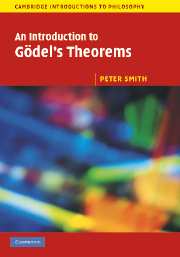Book contents
- Frontmatter
- Contents
- Preface
- 1 What Gödel's Theorems say
- 2 Decidability and enumerability
- 3 Axiomatized formal theories
- 4 Capturing numerical properties
- 5 The truths of arithmetic
- 6 Sufficiently strong arithmetics
- 7 Interlude: Taking stock
- 8 Two formalized arithmetics
- 9 What Q can prove
- 10 First-order Peano Arithmetic
- 11 Primitive recursive functions
- 12 Capturing p.r. functions
- 13 Q is p.r. adequate
- 14 Interlude: A very little about Principia
- 15 The arithmetization of syntax
- 16 PA is incomplete
- 17 Gödel's First Theorem
- 18 Interlude: About the First Theorem
- 19 Strengthening the First Theorem
- 20 The Diagonalization Lemma
- 21 Using the Diagonalization Lemma
- 22 Second-order arithmetics
- 23 Interlude: Incompleteness and Isaacson's conjecture
- 24 Gödel's Second Theorem for PA
- 25 The derivability conditions
- 26 Deriving the derivability conditions
- 27 Reflections
- 28 Interlude: About the Second Theorem
- 29 µ-Recursive functions
- 30 Undecidability and incompleteness
- 31 Turing machines
- 32 Turing machines and recursiveness
- 33 Halting problems
- 34 The Church–Turing Thesis
- 35 Proving the Thesis?
- 36 Looking back
- Further reading
- Bibliography
- Index
1 - What Gödel's Theorems say
Published online by Cambridge University Press: 05 June 2012
- Frontmatter
- Contents
- Preface
- 1 What Gödel's Theorems say
- 2 Decidability and enumerability
- 3 Axiomatized formal theories
- 4 Capturing numerical properties
- 5 The truths of arithmetic
- 6 Sufficiently strong arithmetics
- 7 Interlude: Taking stock
- 8 Two formalized arithmetics
- 9 What Q can prove
- 10 First-order Peano Arithmetic
- 11 Primitive recursive functions
- 12 Capturing p.r. functions
- 13 Q is p.r. adequate
- 14 Interlude: A very little about Principia
- 15 The arithmetization of syntax
- 16 PA is incomplete
- 17 Gödel's First Theorem
- 18 Interlude: About the First Theorem
- 19 Strengthening the First Theorem
- 20 The Diagonalization Lemma
- 21 Using the Diagonalization Lemma
- 22 Second-order arithmetics
- 23 Interlude: Incompleteness and Isaacson's conjecture
- 24 Gödel's Second Theorem for PA
- 25 The derivability conditions
- 26 Deriving the derivability conditions
- 27 Reflections
- 28 Interlude: About the Second Theorem
- 29 µ-Recursive functions
- 30 Undecidability and incompleteness
- 31 Turing machines
- 32 Turing machines and recursiveness
- 33 Halting problems
- 34 The Church–Turing Thesis
- 35 Proving the Thesis?
- 36 Looking back
- Further reading
- Bibliography
- Index
Summary
Basic arithmetic
It seems to be child's play to grasp the fundamental notions involved in the arithmetic of addition and multiplication. Starting from zero, there is a sequence of ‘counting’ numbers, each having just one immediate successor. This sequence of numbers – officially, the natural numbers – continues without end, never circling back on itself; and there are no ‘stray’ numbers, lurking outside this sequence. Adding n to m is the operation of starting from m in the number sequence and moving n places along. Multiplying m by n is the operation of (starting from zero and) repeatedly adding m, n times. And that's about it.
Once these fundamental notions are in place, we can readily define many more arithmetical notions in terms of them. Thus, for any natural numbers m and n, m < n iff there is a number k ≠ 0 such that m + k = n. m is a factor of n iff 0 < m and there is some number k such that 0 < k and m × k = n. m is even iff it has 2 as a factor. m is prime iff 1 < m and m's only factors are 1 and itself. And so on.
Using our basic and/or defined concepts, we can then make various general claims about the arithmetic of addition and multiplication. There are familiar truths like ‘addition is commutative’, i.e. for any numbers m and n, we have m + n = n + m.
Information
- Type
- Chapter
- Information
- An Introduction to Gödel's Theorems , pp. 1 - 7Publisher: Cambridge University PressPrint publication year: 2007
